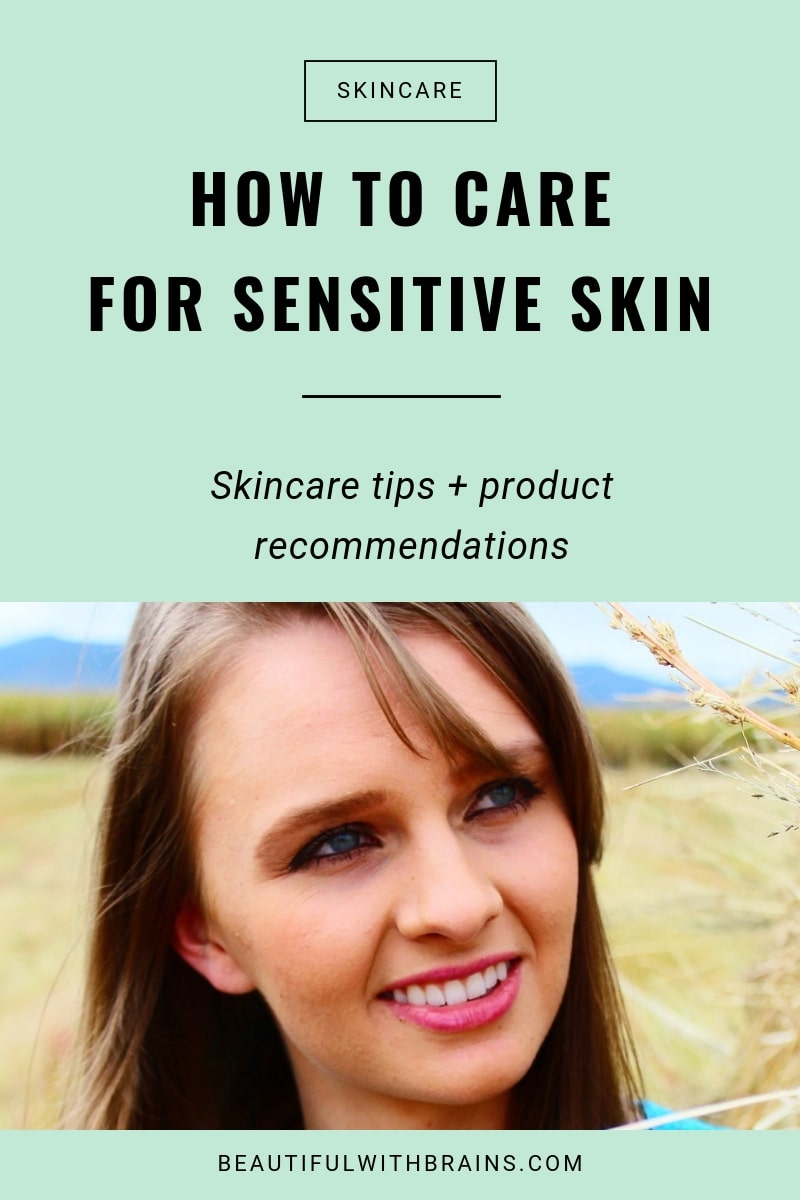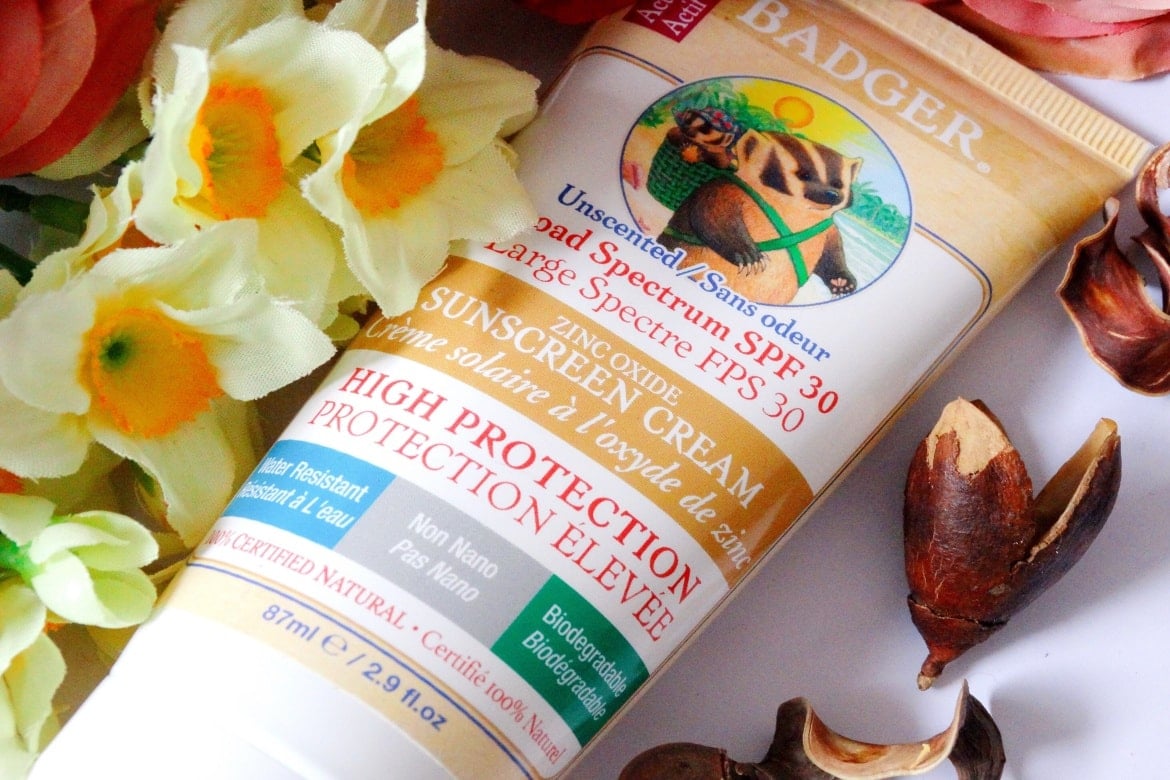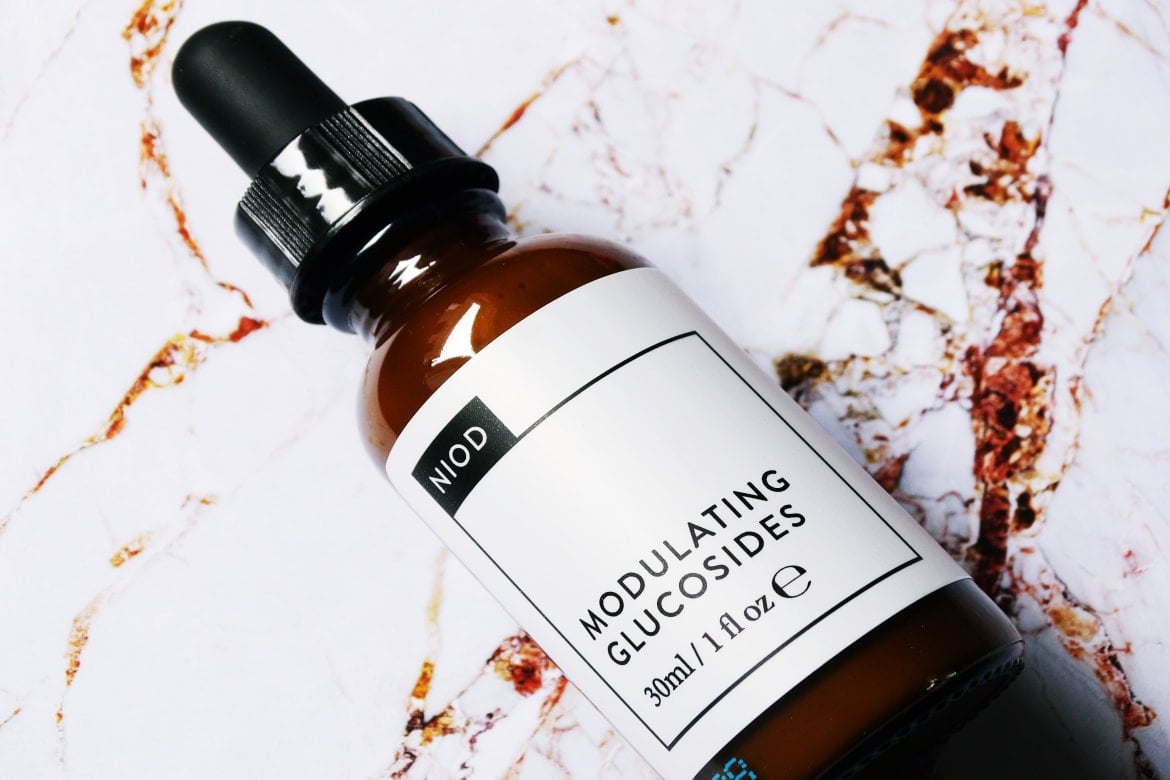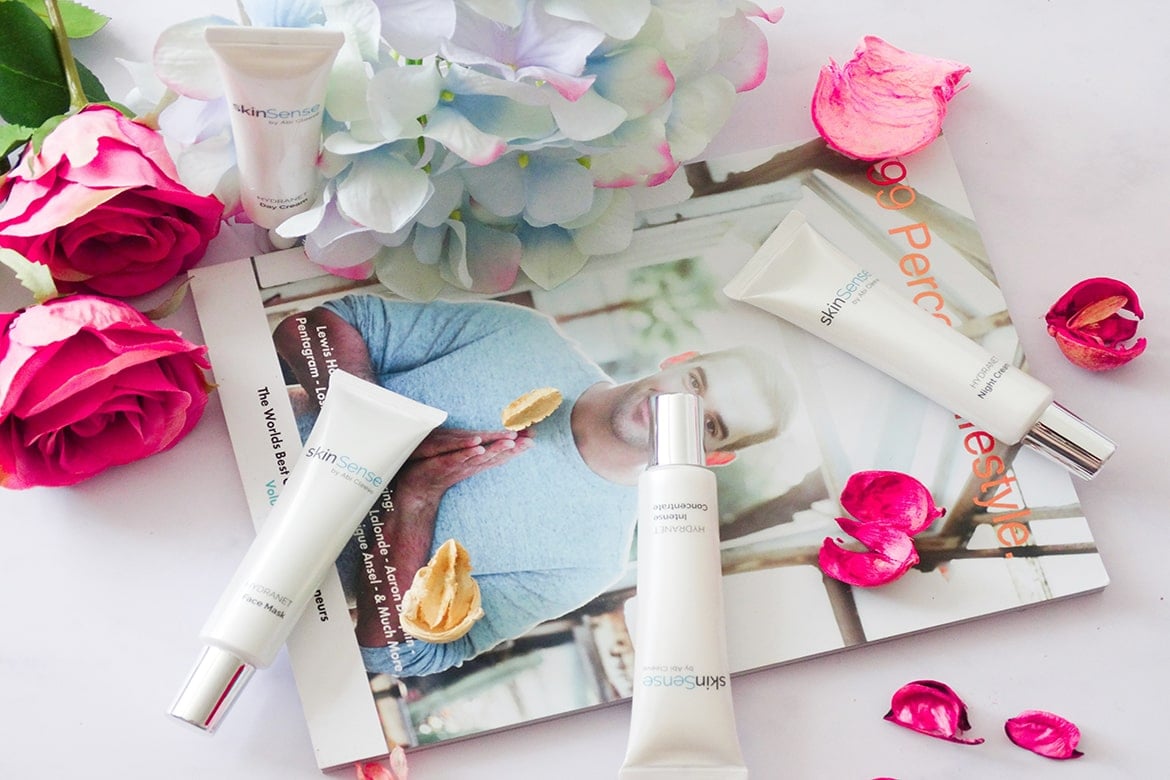Sensitive skin is a drama queen.
It’s always throwing tantrums for the most random things. But it never tells you what the heck is wrong with it. Once it decides it doesn’t like something, there’s no reasoning with it. Argh!
Dealing with a drama queen is never fun. But when you start listening to it carefully and understand what pushes its button, you can heal your relationship and become BFFs for life.
Here’s how how to care for and soothe sensitive skin:
- Sensitive Skin Tip #1: Choose Products With Short Ingredient Lists
- Sensitive Skin Tip #2: Stay Away From Fragrance – It’s The Most Irritating Ingredient In Skincare!
- Sensitive Skin Tip #3: Don’t Use Essential Oils – Their Fragrance Is Irritating Too
- Sensitive Skin Tip #4: Stay Clear Of All The Other Irritating Stuff Too
- Sensitive Skin Tip #5: Ditch The Bar Soap (And Anything That Foams)
- Sensitive Skin Tip #6: Use Skincare Products Loaded With Anti-Inflammatory Ingredients
- Sensitive Skin Tip #7: Do A Patch Test Before Trying A New Skincare Product
- Sensitive Skin Tip #8: Introduce One New Skincare Product At A Time Into Your Skincare Routine
- Sensitive Skin Tip #9: Don’t Munch On Inflammatory Foods
- The Bottom Line
Sensitive Skin Tip #1: Choose Products With Short Ingredient Lists
The shorter the ingredient list, the better. The less stuff a cream contains, the less likely something in there will bother your skin.
Plus, a short ingredient list is much easier to decipher, so you won’t get a massive headache.
Related: How To Read An Ingredient List (Even If You Hate Science)
Sensitive Skin Tip #2: Stay Away From Fragrance – It’s The Most Irritating Ingredient In Skincare!
Slathering on a cream that smells of roses and raspberries is so much better than using one that smells of, well… you know that faint chemical odour fragrance-free creams have.
But that’s NOT what your skin likes. Dare to put it in touch with fragrance and it’ll repay you with a rash.
Here’s a little secret: fragrances are made up of 100 or more ingredients. Some of them are famous for causing allergies (yes, citronellol and linalool, I’m looking at you).
If you spot anything you like with the words “perfume” and “fragrance” while out skincare shopping, put it back on the shelf. Unless you want your skin to throw another tantrum, that is.
Related: Why You Should Avoid Scented Skincare Products
Sensitive Skin Tip #3: Don’t Use Essential Oils – Their Fragrance Is Irritating Too
Wait, isn’t anything natural supposed to be good for your skin? Not really.
You know those chemicals you hate so much? Essential oils are made up of hundreds of chemicals. And some of them can be irritating or cause allergies, too.
Take chamomile, for example. Bisabobol is the chemical that makes chamomile so soothing. But chamomile also contains allergens (about 7%).
So, use the bisabobol and ditch the oil. These days, it’s so easy to extract the goodies from these plants and just put those in cosmetics. That way, you get all the benefits without the side effects.
P.S. It’s not always easy to spot essential oils on the label. Look out for anything that says “leaf oil”, such as thyme leaf oil (“leaf extract” is ok).
Related: Is Chamomile Good Or Bad For Skin?
Sensitive Skin Tip #4: Stay Clear Of All The Other Irritating Stuff Too
Fragrance and essential oils are the worst culprits (that’s why they deserved their own sections), but there’s plenty of other stuff lurking in your lotions and potions that could irritate your skin:
- Alcohol Denat (or Alcohol SD)
- Ammonium Lauryl Sulfate
- Apricot kernels
- Colourants
- Dyes
- Formaldehyde-releasing preservatives
- Glycolic acid (may be too harsh for sensitive skin)
- Methylchloroisothiazolinone
- Methylisothiazolinone
- Sodium Lauryl Sulfate
- Vitamin A (may be too harsh for sensitive skin)
- Vitamin C (may be too harsh for sensitive skin)
Afraid you won’t remember them all? I’ve got you covered. Click on the image below to subscribe to my newsletter and receive the “Irritating Ingredients Cheat Sheet” with the most irritating ingredients lurking in your cosmetics:
P.S. This doesn’t mean these ingredients are the devil incarnate and should be avoided at all costs. Most skin types can use them safely. It’s only sensitive skin that has to beware of them.
Related: Can You Use A Vitamin C Serum If You Have Sensitive Skin?
Sensitive Skin Tip #5: Ditch The Bar Soap (And Anything That Foams)
The “glue” that holds bar soaps together are in an alkaline base. That’s scientific jargon for high pH.
When the ph’s too high, your skin’s protective barrier gets damaged. Moisture gets out and bacteria and other nasty stuff get in. Result? Dry, irritated skin.
Foaming cleansers are better, but they too tend to be harsh for anyone who doesn’t have oily skin. They usually remove too much sebum (the skin’s natural moisturizer), leaving skin dry and prone to irritations.
The solution? Opt for cream, balm or oil-based cleansers instead. If you don’t need to remove your makeup, you can get away with a micellar water too.
Best Picks:
- CeraVe Hydrating Facial Cleanser ($14.99): available at Dermstore, Feel Unique, Ulta and Walmart
- La Roche Posay Toleriane Dermo Cleanser (£8.75): available at Dermstore and Feel Unique
- Paula’s Choice Skin Recovery Softening Cream Cleanser ($17.00): available at Dermstore and Paula’s Choice
Related: How To Choose The Right Cleanser For Your Skin Type
Sensitive Skin Tip #6: Use Skincare Products Loaded With Anti-Inflammatory Ingredients
Ok, now that you know what to avoid, it’s time to focus on what you can use (finally!).
Opt for products that have plenty of anti-inflammatory ingredients. The best ones are:
- Allantoin
- Aloe vera
- Bisabobol
- Colloidal oatmeal
- Green tea
- Niacinamide
Best Picks:
- Aveeno Eczema Therapy Moisturizing Cream ($13.49): available at Ulta and Walmart
- Niod Modulating Glucosides ($21.00): available at Harrods
- Paula’s Choice Calm Redness Relief Repairing Serum ($34.00): available at Paula’s Choice
Related: 9 Ingredients To Soothe Irritated And Sensitive Skin
Sensitive Skin Tip #7: Do A Patch Test Before Trying A New Skincare Product
I know, who does those? They sound so lame. But if your skin’s sensitive, they can be a lifesaver.
I mean, if something goes wrong and you end up covered in hives, wouldn’t you rather the damage be limited to a small area, like a wrist, than you whole face?
Thought so. Do the patch test.
P.S. Some ingredients don’t bother your skin immediately. You can use something safely for years and then one day, completely out of the blue, develop an allergy to it. Patch tests ain’t a one-time thing. Do them regularly.
Related: How To Do A Patch Test
Sensitive Skin Tip #8: Introduce One New Skincare Product At A Time Into Your Skincare Routine
The reason is simple. As tempting as it is to use all your new goodies at the same time, how do you know which one is to blame for that ugly rash?
Use them one at a time. And I don’t mean one a day. One a month, more like. Yep, that’s how long you should wait before introducing ONE new skincare product into your routine.
I know, bummer. But that’s what the drama queen needs.
Related: The Right Way To Introduce New Skincare Products Into Your Skincare Routine
Sensitive Skin Tip #9: Don’t Munch On Inflammatory Foods
Are you doing everything right and still your skin keeps throwing tantrums? Maybe your skincare ain’t the problem. Maybe it’s your diet you have to change.
Lots of the foods we love (cake, anyone?) can trigger inflammation in the body. And that shows up on your skin in the form of redness, rashes, hives… It ain’t pretty.
The worst culprits?:
- Alcohol
- Dairy
- Spicy foods
- Sugar
I’m not saying you should eliminate them from your diet completely (although, sometimes, you just may have to, sorry!), but cut them back as much as you can and see how your skin reacts. Chances are, your skin will decide to behave nicely for once!
The Bottom Line
Sensitive skin is an intense and demanding drama queen. But by avoiding its triggers and focusing on creating a soothing and relaxing atmosphere, you can calm it down and enjoy a loving and beautiful relationship.







I have sensitive skin, and also an allergy to linalool. It was in my shampoo and conditioner and gave me contact dermatitis around my eyes. I’ve been fragrance free for years for my skincare and makeup, as it broke me out. However, now that I’m in my early 50’s I’ve had to go completely fragrance free, even bodywash and shampoo. I guess the immune system gets even more sensitive over the years. This was a great blog post, and you’ve summed up what to do very well.
Sherry, sorry to hear your skin is so sensitive. It really is a pain to deal with, especially as you get older. But you get better at dealing with it too overtime. Thanks. 🙂
At first I also think that having sensitive skin is such a festy annoyance. But then my doctor reminded me that it’s actually a blessing. Because my sensitive skin has taught me the importance of sunscreen and moisturiser waaaay earlier than my peers (Atopic Dermatitis is a very demanding skin condition), sensitive skin also taught me the hard way to always read the ingredients and understand it before applying it on my skin, even just for a patch test in the store. All of these stuffs lead me to be a conscious consumer and these days being a conscious consumer has been giving me more benefits than I could ever imagine. I also save tons of money from buyingt products that are gimmicky, because I can go past through their marketing and go straight to the back of the box to see whether their ingredients backup their claims 🙂 So I agree that it sometimes can feel like an annoying drama queen but actually it’s a blessing in a disguise from nature.
Audrey, that’s a wonderful way to look at it. Sensitive skin has its silver lining indeed.
I agree. I’ve found it to be a real positive. As you say, it saves you money. I also think that fragrance is an irritant, and even if you aren’t allergic or sensitive, it can cause dryness for dry skin people, and breakouts for oily skin people. I’ve even found it to be worthwhile for my hair, as it’s in much better condition.
Yes, I started using SLS-free shampoos a few months ago and for the first time in my life, my hair actually shines as good as advertised on TV. I also heard that washing our hair with cold soft water (instead of hard unfiltered tap water) is even better for our hair in the long run 🙂
Glad it’s working well for you. I should try it too but my hair is very oil so it’d get a LOT worse before it gets even a tiny little bit better…
Yes, mine too! It was so oily I have to wash it 2x a day (but I only wash it 1x/day due to laziness). When I traioned my hair I put it in a messy bun all the time (for at least 6-7 days before washing it) so I don’t have to see the amount of oil at first. I also didn’t use any dry shampoo to really fill every inch of my scalp with natural oil. Now I can go 3-4 days before my hair gets a bit oily (without dry shampoo) and I can definitely go a week with dry shampoo.
You give me hope, Audrey. It’s just the transition period than I dread. I’m a freelancer and it’s not professional to meet your clients with a head full of dirty and oily hair. The messy bun is a good idea, though.
Hi there, thank you for this article! I have quite sensitive skin, and it seems to get more sensitive over years – now I’m 38 and I can’t believe that my skin used to tolerate very harsh products when I was younger; now I have to be super careful as to what I put on my face. However, it is really a blessing in disguise, as I had to learn a lot about proper skin care and which ingredients I should avoid. Also my skin looks much younger – usually people think I am around 5-7 years younger and even people who work in beauty industry (facialists and massage therapists) are surprised when they find out my age. My facialists says that, because my skin is really thin, it reacts better to treatment.
I’ve got one question to you about sensitive skin. How should I exfoliate? I’m afraid to even try retinoids and acids; are there safe choices for me? I’ve tried some enzyme peelings, and though they do not irritate my skin, I really see no difference and am not sure they are doing anything. Thank you in advance!
Anastasia, lactic acid is the best choice for sensitive skin. It’s the mildest of the acids so, often sensitive skin is able to tolerate it. Just limit its use to once or twice a week. if even this is too much, try a washcloth.
I have sensitive skin and have just recently realized that it is the cause for my acne (IK I’m dumb). So I’ve been using the Body Shop’s aloe vera line. I was wondering what are your thoughts on this line?